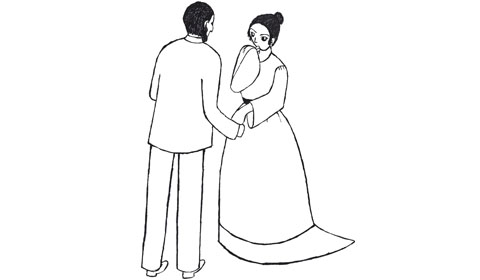
About a year ago, I found a book in my house called Parlour Pastimes: A repertoire of acting charades, fire-side games, enigmas, riddles, charades, conundrums, arithmetical and mechanical puzzles, parlour magic, etc., etc. The name pretty much captures the tone and contents of the book. Originally published in 1857 (my mom found this circa 1870 copy in a used bookstore in London), the book includes instructions for a party game where you provide facts about historical figures, another where you recite poems, and a four-page charade for the word “Rainbow” with dialogue clues such as “Here, by Carron, Ranging so wildly to the quiet Forth, Are many meet retreats, wherein to plant Our thistle-garnish’d standard.”
Now that sounds like a party.
Whenever I read the (probably literally) arsenic green book, I’m struck by how much teen parties have changed since the 1800s. Guests don’t gather in a circle to play Capping Verses (“a pleasing and not unprofitable fire-side amusement”) or Zoological Recreations. There are no Tableaux Vivants or Logogriphs.
I find parlour games appealing. While I can’t repeat the story of Alexander and Diogenes (what on Earth is that?) or dance a quadrille blindfolded (how do you dance a quadrille in the first place?), many of the games still work. One, called Compliments, involves turning to someone of the opposite gender and comparing him or her favorably to something unattractive, like a snake or a cabinet. The book gives the example of a boy being told that he is like a book-case “because you are handsomely made, and contain much valuable information.” Pretty sassy for 1857. Another game involves the players writing names, dates, and parts of speech on a paper, which they then have to read in the context of a fill-in-the-blank announcement, like homemade Mad-Libs. The punishments for losing a game include singing a song in front of everyone, confessing who you like, and picking a number from 1 to 3 without knowing whether it represents a pinch, a kiss, or a box on the ear.
The disappearance of organized, non truth-or-dare-esque activities from teen parties seems to be a fairly recent phenomenon. One of my neighbors, who is a very youthful 86, once questioned me about school dances. “Do they still play that game, dear,” she asked, “where the boys stand on one side of the room and the girls stand on the other, and you each get half of an adage, and on “go” you have to find the boy with the other half of your saying?” I told her that no, we’d never played that game. We dance (or don’t dance) while a DJ plays loud music. That isn’t to say that middle school me would have enjoyed playing organized games at a school dance. I probably would have hidden in a corner. And the loud, light-stick-throwing bar and bat mitzvah DJs always made me uncomfortable. I always loved when a bar mitzvah had a little art station or face paint or the like. I always have face paint at my birthday. I will probably be the awkward person who has a craft-table at my wedding. I just think that, especially as an introvert, it’s always nice to have something to do beyond shmoozing. And I know that I’m not the only one who finds mingling uncomfortable.
I do like music and visiting with friends. I will also readily admit that organized games can be miserable. In truth, I think that games are like so many other things: they’re only as fun as you make them. But a few months ago, sitting on my floor playing “Good Evening, Graceful Lady” with fifteen-or-so people, or a few months before that, having a frighteningly intense, two hour Mafia marathon with other CITs and counselors at camp, I couldn’t help but wish for a world with more parlour pastimes.









